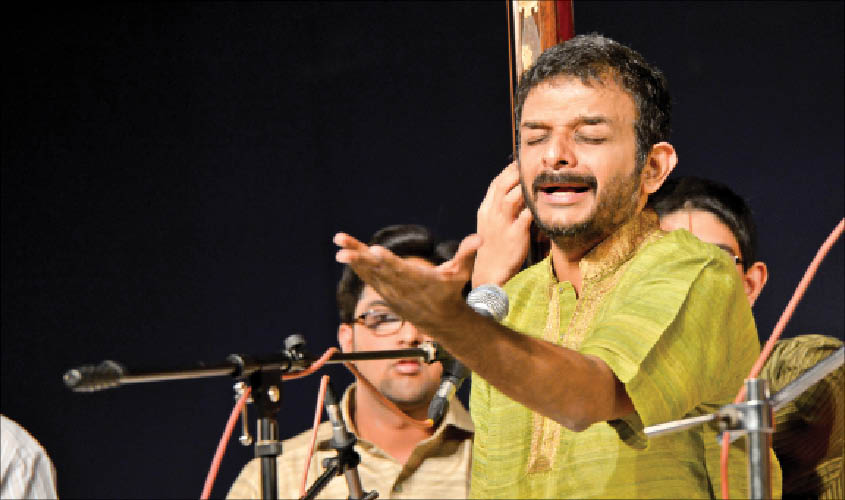In Reshaping Art, author and musician T.M. Krishna presents a wide-ranging critique of the Carnatic tradition while attacking its caste and gender-based hierarchical framework, writes Bhumika Popli.
In July 2009, I started learning Carnatic music. But before that, for almost two months, I suffered an extended spell of self-doubt. Being a North Indian, how was I to learn Carnatic music? This dilemma made me delay my enrollment in the music class, which took place right across my house, at a South Indian temple. Every evening, during the dusk hours, I could hear melodious voices emanating from the temple. I was passionate about singing, and eventually my passion got the better of my doubts. Right on the day of the first lesson, I realised what a fool I had been. It was foolish
Reading Reshaping Art, by the acclaimed musician of the Carnatic tradition T.M. Krishna, reconfirmed my belief in the universality of Carnatic music. According to him, art doesn’t belong to specific communities or clans—whether these are defined along ethnic, caste or gender lines.
In the eight chapters of the book, Krishna presents a social critique of the Carnatic tradition, which has for centuries been bogged down by hierarchical thinking.
Readers looking to understand the basics of Carnatic music should look for his previous book, titled A Southern Music: The Karnatik Story, which was published in 2013. Reshaping Art, too, is a large repository of knowledge related to Carnatic music. But in this case, the author is interested in exploring the social, historical and political roots of this musical form.
Reshaping Art sheds light on the history of the Carnatic tradition, and challenges age-old conventions. It proposes to dismantle social constructs, like caste, that have restricted the scope of this form. And it calls out the rampant misogyny that continues to corrupt this field.
Krishna is himself a renowned Carnatic vocalist. He doesn’t usually perform at concert-like settings, tending to choose unconventional venues for which he also draws a lot of flak from the purists. To prove his democratic viewpoint he has collaborated with singers from diverse backgrounds. He has performed with Jogappas, or transgender musicians; with the environmentalist Nityanand Jayaraman; and recently with rapper Sofia Ashraf on the Kodaikanal issue. Last month he also received many threats on social media after announcing that he will be releasing one song each month on Jesus or Allah to keep the communal forces in music at bay.
The author, in this book, also introduces us to a musical genre called Gana, a rendition developed by the Dalit migrant population, which settled in Madras in the 19th century and whose songs were mainly meant to be sung at funerals or for the homeless. But now the form has evolved and reached the concert stage. Gana is still regarded with disdain by, Krishna writes, “those who have set themselves up as arbitrators of culture”. Paraiattam, an old dancing-drumming art form practised by Dalits, is also facing the same resistance.

Krishna says that along with the severe caste and class divides affecting the Carnatic tradition, there is also a major gender problem. He writes, “Does feminism have a role in Indian arts? Where is the voice of women?”
He strongly criticises the filmmakers who in the name of making women-centric films give the final word to the man, “the eternal saviour”. Krishna asks us to learn from the example of Koodiattam, a form of ritual theatre traditionally performed in Kerala, which is known for addressing women-centric subjects.
The author draws our attention to the “benefactors” of art—the ones who are at the receiving end. According to Krishna, “The artists, merely, in the end just become a puppet at the hands of patron-consumer rather than someone who shares the art with the public. All this leads to an inherent insecurity within artists.”
He wants music to be judged for what it is—an art form—and not for factors extraneous to it. As he writes, “…musicians have to create the impression of being moral, pious creatures even if they are not. Or, maybe, like all of us, they compartmentalise their various selves. Even today, women musicians feel the need to de-sexualise themselves and radiate piousness. This is taken as a sign of their seriousness towards the art form. The less skin you reveal, the more divine your music. All this is bulldozed upon them in the name of appropriateness.”
The most beautiful part of the book comes when the author owns up to his own shortcomings.
He writes, “As a Karnatik singer, I had to role-play, act as an interlocutor between my community and its moral, religious and cultural moorings. Every time I rendered kirtanas, expounded ragas or cracked arithmetic patterns, I was holding up my community flag and waving it with gusto. The entire environment participated in this celebration. There is no doubt that the music was beautiful but that it was constricted is also true.”
Krishna had to perform within the set boundaries of the Karnatic tradition. “As I began probing my engagement with the art, I realised that everything that was built around the art—the scaffolding, paraphernalia, social constructions—were barricades,” writes the vocalist.
After reading the book, we understand that Krishna is urging the reader to break the regressive barriers of caste, class, race and gender and simply be mesmerised by the power of Carnatic music.
Reshaping Art; by T.M. Krishna; Aleph Book Company; Pages:116; Price: Rs 399

